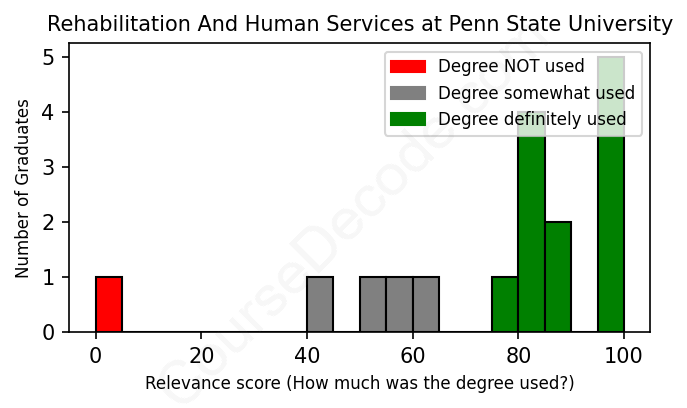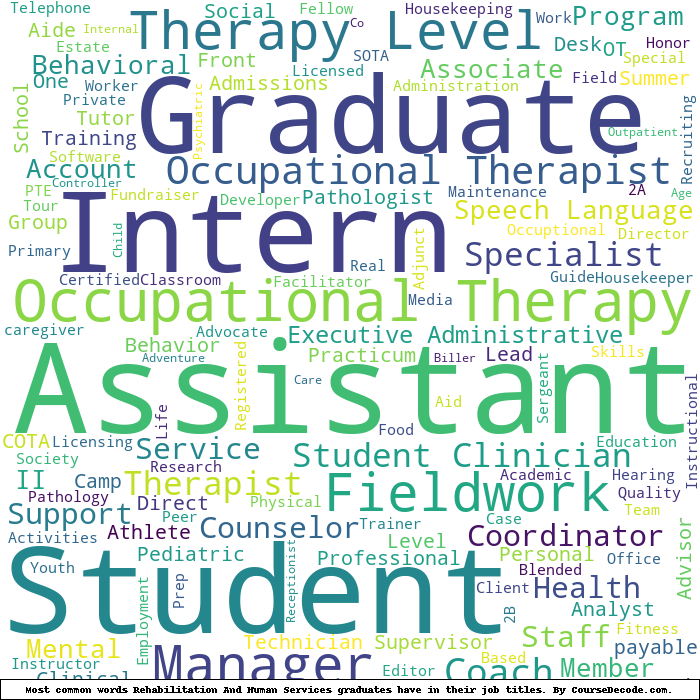
First, some facts. Of the Rehabilitation And Human Services graduates from Penn State University we've analyzed , here's how many have used (or NOT used) their degree in their career:

These are estimates based on AI analysis of 17 LinkedIn profiles (see below).
The verdict? Above average. Overall, with an average relevance score of 75%, Rehabilitation And Human Services graduates from Penn State University have a higher likelihood (+8%) of finding work in this field compared to the average graduate across all fields:
And for comparison, here's the chart for all profiles we've looked at across all degrees.
Also, after graduating, 52% of these graduates have pursued further education other than another Bachelor's degree (such as a Masters degree or other), compared to the average across all profiles of 35%. This suggests you may need more than just a Bachelors degree to be competitive as a Rehabilitation And Human Services graduate.
See the details:
|
Relevance score: 50% We think this person has gone into a career only somewhat relevant to their degree. We think this person has gone into a career only somewhat relevant to their degree.
DEGREE INFOGraduated in 2015 from Penn State University with a Bachelor of Science (B.S.) in Rehabilitation And Human Services. No other secondary education since. JOB HISTORY SINCE GRADUATIONContract Administration Specialist 2 Penn State University Jul 2019 - Present ABOUTNo information provided. |
The top 10 most common jobs done by the graduates we've analyzed (ranked most common to least) are:
Here is a visual representation of the most common words in job titles for Rehabilitation And Human Services graduates (this is across all Rehabilitation And Human Services graduates we've analyzed, not just those who went to Penn State University):

Looking at the career trajectories of Penn State graduates with degrees in Rehabilitation and Human Services, it’s pretty clear that they tend to start their journeys in roles that are either directly related to support services or more general administrative positions. Many graduates have landed roles such as interns, therapists, or even working directly in health care settings right after graduation. For example, some entered as therapists or case managers within a year or two, which aligns well with their degrees. However, there are also graduates who seem to have veered off into more unrelated fields initially, working as receptionists, fundraisers, or even in general customer service. This mix shows a range of entry points into the job market.
Fast forward five to ten years, and it looks like many of these individuals find their way into more specialized and relevant careers. A good number have progressed into roles like occupational therapists, program managers, or licensed counselors, reflecting a strong commitment to the health and rehabilitation field. However, it's also notable that some of their paths have taken unexpected turns into completely different sectors, such as real estate or corporate positions, which might not leverage their specific training. Overall, while there are success stories aligned with their education, there are also those who haven’t quite maintained a trajectory directly related to Rehabilitation and Human Services. But hey, career paths can be winding, and it seems many do eventually find their way back to meaningful work in their field!
Honestly, a Bachelor’s degree in Rehabilitation and Human Services, like the one at Penn State, strikes a balance between being challenging and manageable. You’ll definitely have to tackle some coursework that dives deep into psychology, sociology, and various rehabilitation practices, so you'd need to stay engaged and keep up with readings and assignments. However, a lot of students find the material interesting and relevant, which can make the studying feel less like a slog. Plus, professors are generally pretty supportive and willing to help if you’re struggling, so if you put in the effort and stay organized, you should be able to handle it without too much stress. It’s not the easiest degree out there, but it’s also not the hardest—you just need to stay on top of things!
Most commonly, in the LinkedIn profiles we've looked at, it takes people 4 years to finish a Bachelor degree in Rehabilitation And Human Services.
Looking at these graduates from Penn State University, it seems like they’ve had quite a mixed bag when it comes to salary potential. The ones who graduated earlier, especially around 2010 and 2013, started with pretty basic jobs and seem to be climbing the ladder slowly, but they might not have made bang for their buck in the earlier years. Those who graduated more recently, especially in fields like occupational therapy or with roles like personal trainers and therapists, have a bit more likelihood of earning decent money as they gain experience, but entry-level positions can still be pretty modest. Overall, there’s definitely potential for good earnings down the line, especially in healthcare and therapy roles, but it looks like many have had to work their way up from the ground level, which could mean a bumpy start with not-so-great pay.
Here is a visual representation of the most common words seen in the "about" section of LinkedIn profiles who have a Bachelor degree in Rehabilitation And Human Services (this is across all Rehabilitation And Human Services graduates we've analyzed, not just those who went to Penn State University). This may or may not be useful:

Here are all colleges offering a Bachelor degree in Rehabilitation And Human Services (ordered by the average relevance score of their Rehabilitation And Human Services graduates, best to worst) where we have analyzed at least 10 of their graduates:
| College | Score | Count |
|---|---|---|
 Penn State University Penn State University
|
75 | 17 |